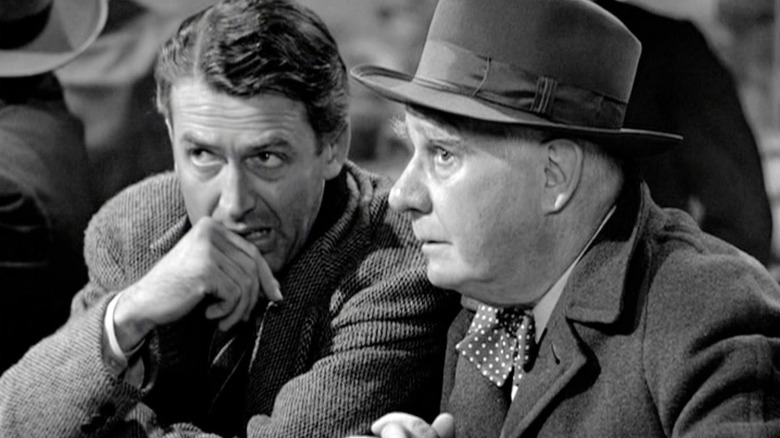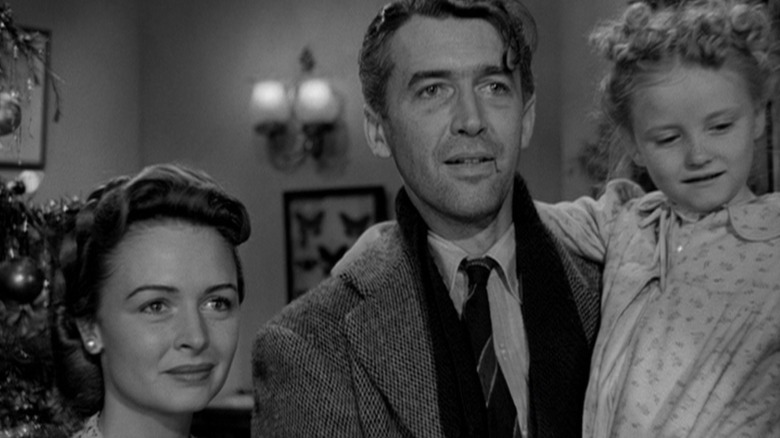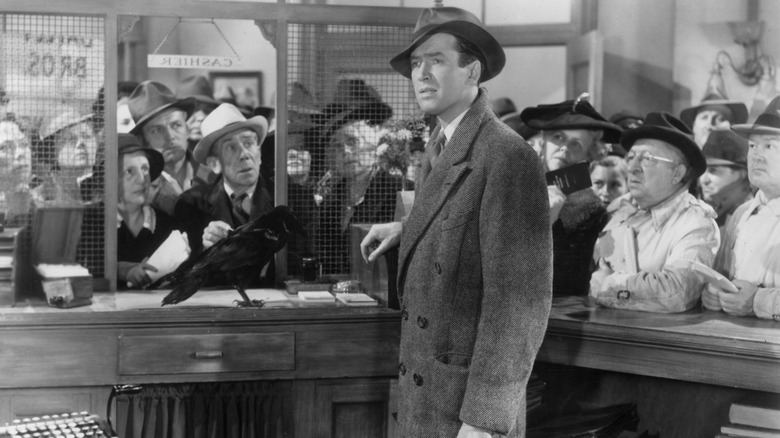A James Stewart Christmas Classic Gets Steven Spielberg's Seal Of Approval
In 2024, Steven Spielberg listed his 20 favorite movies of all time for Far Out Magazine, and many of them are indelible classics that one might expect Spielberg to list. "Seven Samurai," "Citizen Kane," "Day For Night," and "2001: A Space Odyssey" are all on the list, of course, although he did also throw in a few curveballs. James Gunn's "Guardians of the Galaxy" was mentioned, as was Olivier Nakache's and Éric Toledano's 2011 film "The Intouchables." He also picked out Victor Fleming's relatively obscure 1943 film "A Guy Named Joe" as one of the best ever, although that tracks; Spielberg remade the film in 1989 as "Always."
Spielberg's #1 film of all time, however, was a safe and reliable standby; he's very fond of Frank Capra's Christmas classic "It's a Wonderful Life." But then, who doesn't like "It's a Wonderful Life?"
The story of Capra's classic is possibly well-known even to non-cinephiles. The film was only warmly reviewed when it was first released, with some critics complaining about its overbearing sentimentality and stiff theatricality; it didn't tap into the real-world concerns felt by audiences at the time. It came in seventh place at the box office that year, but it lost a pile of cash for its studio, RKO. It was nominated for six Academy Awards, including Best Picture, Best Actor, and Best Director, but it only won a technical Oscar for its fake snow. The film was steamrolled by "The Best Years of Our Lives."
Because "Wonderful Life" was a bomb, it vanished from the public eye for decades. It wasn't until it started annually running on television that the film was "rescued." It's now often considered one of the best movies of all time — and not just by Spielberg.
When It's a Wonderful Life came back to life
"It's a Wonderful Life" wasn't really explored deeply after it exited the Oscars conversation in the late 1940s. Capra continued to make well-regarded films, but "Wonderful Life" was seen as the end of the line after a series of hits. The film went unregarded for many, many years.
In 1974, "Wonderful Life" lapsed into the public domain, and local TV stations found they could throw it on for free, and decided to do so during the Christmas season. It became an easy Christmas tradition for many TV stations, and audiences finally began to attach themselves to it. The repeated reruns of "Wonderful Life" on TV didn't just give it new life, but allowed it to explode in the public consciousness. Pretty soon, it became a vital and necessary part of the Christmas season.
The film underwent bold new critical re-litigation, and critics began understanding it to be one of the finest films of its decade, if not of all time. It's been listed by the AFI as one of the 100 best ever, and was inducted into the National Film Registry in 1990.
The film became so familiar that its premise was borrowed by movies and sitcoms in perpetuity. It was spoofed by "Saturday Night Live" in 1986, and was re-made by the Tiny Toons in their 1992 special "It's a Wonderful Tiny Toons Christmas." "Married... with Children" satirized it. Heck, pick out a random TV series, and it's likely it had a "Wonderful Life" episode — that is, a story that allowed the protagonist to see into a parallel universe where they had never been born. "It's a Wonderful Life" has become just as mythic as Charles Dickens' "A Christmas Carol."
It makes sense that Steven Spielberg loves It's a Wonderful Life
It feels churlish to mention the story of "It's a Wonderful Life," given how well-known it is, but to do my due diligence: "It's a Wonderful Life" is about George Bailey (James Stewart), a pretty decent guy. As a kid, he saved his brother from drowning, an act that left him unable to hear out of one ear. He helped out the local pharmacist and prevented him from making a grievous drug-related mistake. George unwittingly inherited his father's savings and loan business and is forced to run it for years, despite many attempts to offload it and get out of his small town of Bedford Falls. He marries his sweetheart Mary (Donna Reed), but still aims to flee.
After a great deal of cash is accidentally misplaced by one of George's associates, and the town's greedy fat cat Mr. Potter (Lionel Barrymore) refuses to give him any kind of financial help, George runs to a bridge hoping to throw himself off. While contemplating self-slaughter, George encounters an angel (!) named Clarence (Henry Travers) who tells him that life is worth living. George, in a depressive funk, explains to Clarence that his mere existence is a burden to the world. Clarence proves him wrong by showing George a parallel universe where he was never born. Everyone's lives are terrible in that world. George, it seems, is a vital piece in the happiness of Bedford Falls. (The final parallel universe sequences take up a surprisingly small amount of the film's runtime.) In the end, George returns home happy and edified.
It's an uplifting message, of course. We all have value. When we're depressed, we have the bleak imagination to picture a world that is happier without us, and we suddenly lack the imagination to imagine a world that is better because we're in it. But it's fitting that Spielberg, often a cinematic optimist, would be drawn to this story.


